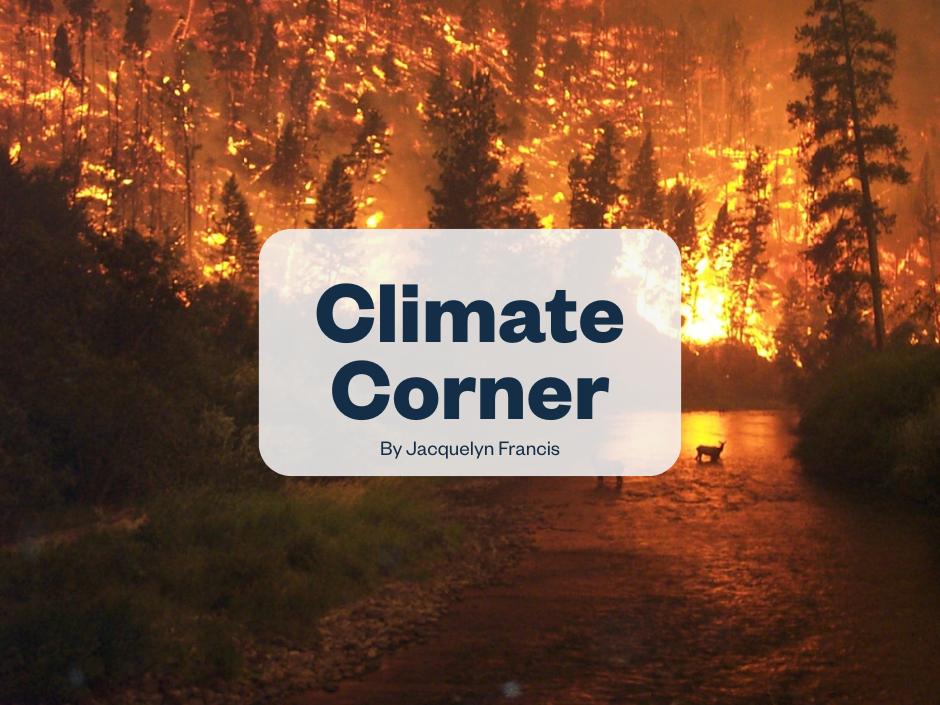Climate Corner: Let’s show the world how to save the world
- Jacquelyn Francis

- Aug 29
- 3 min read

It’s hard to have meaningful conversations around climate when it’s hard to even define “climate.” When I use the term “climate,” to me it’s everything living on Earth and how it’s interconnected — you, me, the trees, the ecosystems, the weather, the future, the past, the present, the economy — even the price of tea in China.
I understand that not everyone connects everything to climate, but I do. Without the climate that currently exists on Earth, nothing we depend on would be recognizable. For example, coastal shorelines will dramatically change — and those living there will likely be climate refugees. How and where we grow food will shift, and farmers will likely be negatively impacted — severely. Storms and fires will be more powerful, and scarcity of resources will ripple throughout political, economic and survival systems globally.
I do understand that my definition is far from accepted by others. However, the Intergovernmental Panel on Climate Change — the body that synthesizes thousands of certified reports and research — says: “In a broader sense, climate is the state of the components of the climate system, including the atmosphere, hydrosphere, cryosphere, lithosphere and biosphere and the interactions between them.”
Given this definition, it becomes obvious that our planet has evolved throughout its 4.543 billion years of development, always seeking to create an equilibrium suitable for life to thrive.
Given that perspective, this could be a magical time, an opportunity for humanity to take a daunting negative and react with solutions that will reward us and all other species with a habitable planet.
But we need to catalyze systems change to do so. We have an extractive economy now. We need to implement a circular one.
There are many things that we might feel are beyond our control. This mindset has to change. Where we store and spend our money is important. Buying insurance or investing reflects our priorities. Find out where your dollars are being reinvested by your insurance companies or your banks. Push your local leaders to move faster toward zero-carbon policies.
For many of us in the Roaring Fork Valley, we know the rules. Go electric when possible and get electricity from renewable sources, walk, bike, use RFTA, or drive an electric vehicle. Eat less meat and buy locally when possible. Always think about quality purchases over quantity and certainly how far that purchase has traveled and what it will become when you throw it away. The ultimate goal is to create a circular economy where we think about all the inputs and outputs of the circular system — returning to some degree of equilibrium.

How could this valley become a poster child for this ideal? Where can we innovate and how can we share the messages of systems change, leadership and success? We can strive for all our electricity to come from renewable sources to power our homes and commercial buildings throughout the entire valley (which Holy Cross is doing). Planning for autonomous electric vehicles, new-generation electric buses, elevated people movers such as valleywide rail could be figured out. We need bike paths that encourage more riders, including e-bikes, with the space and safety to enhance the experience. Our landfill should be transformed into a marketplace where value is identified and waste materials are no longer waste, but assets. This could be accomplished with new technology such as sensors, drones and robots using AI sorting capabilities. Cities in Japan, the Netherlands and even China are doing this, so let’s follow their lead and create a model for our country.
This is a widespread cultural shift, which is hard but also wonderful. Imagine the valley of abundance and opportunity in a world where we are not heading toward an existential crisis. Let’s not blow our chance to be stewards of this planet and thrive as human beings. It’s not time to give up and go out with a bang; it’s time to seize the moment and be proud of the future we can create now.
Climate Corner is a monthly opinion column in the Aspen Daily News, written by GWMP's Founder and Executive Director Jacquelyn Francis.
.png)


